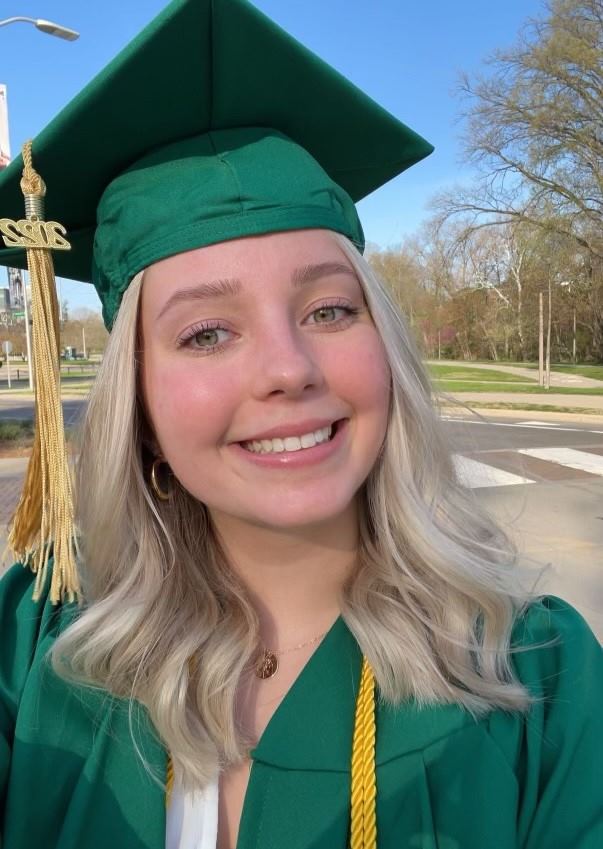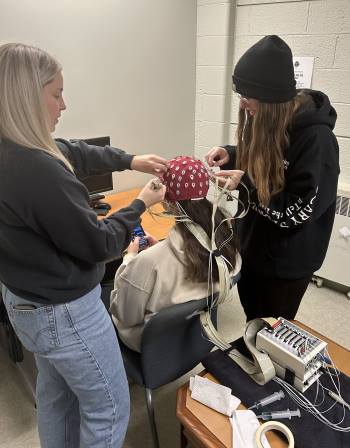Young PSY Alum Spotlight: Bre Lind
July 3, 2024 - Shelly DeJong
 Bre Lind graduated in ‘22 with a Bachelor of Arts in Psychology with a minor in Youth and Society. After graduating, Bre began working as a lab manager for Jason Moser’s Clinical Psychophysiology Lab. She’s now wrapping up her time at MSU as she prepares to head to graduate school for a PhD in clinical psychology. We sat down with Bre recently to talk about her time at MSU, the importance of a gap year, and where she’s heading next.
Bre Lind graduated in ‘22 with a Bachelor of Arts in Psychology with a minor in Youth and Society. After graduating, Bre began working as a lab manager for Jason Moser’s Clinical Psychophysiology Lab. She’s now wrapping up her time at MSU as she prepares to head to graduate school for a PhD in clinical psychology. We sat down with Bre recently to talk about her time at MSU, the importance of a gap year, and where she’s heading next.
When did you realize you wanted to get a PhD?
I attended a panel with Dr. Kelly Klump and Dr. Alex Burt during my first year at MSU, and it helped me realize how interesting research is. They talked about how they initially wanted to focus solely on clinical work, but then they discovered how much they enjoyed research and the flexibility that comes with having a PhD. In my sophomore year, I joined Dr. Jason Moser’s lab, where I truly fell in love with research and became committed to obtaining a PhD. I began gaining more experience and exploring opportunities in other labs to enhance my CV for a career in research.
What research experiences did you have as an undergraduate?
I first joined Dr. Jason Moser’s lab as a research assistant in my sophomore year. I then also worked in Dr. Kelly Klump’s lab for a couple of years, first as a research assistant and then later I was hired as a recruitment coordinator. I was also an undergrad research assistant for Richard Lucas in social-personality psychology for two semesters. I appreciated being able to gain different research perspectives as an undergraduate and to experience working in labs of varying sizes. Dr. Lucas runs a smaller, close-knit lab that meets weekly, Dr. Moser’s lab is of medium-large size, and Dr. Klump’s lab is large. Observing the interactions and mentoring approaches within these labs was valuable in helping me know the type of environment I am most comfortable in and the dynamics I should look for when applying to graduate schools.
 Why did you decide to take a gap year before applying to graduate schools?
Why did you decide to take a gap year before applying to graduate schools?
As an undergrad, my plan was to apply for graduate school in my senior year, but I had an honest discussion with a postdoc in my lab and he shared about how competitive clinical psychology is at the PhD level. I was unaware of that at the time, so I really appreciated the open conversation about how competitive the field is. So, I decided to take some time to get more experience. This period turned out to be crucial for my career path. Not only did I acquire additional research experience, but I also had the time to explore my research interests. Taking a gap year allowed me to better understand what I like before committing to a long program lasting five to six years. I also was able to focus on personal growth and discover activities that I am passionate about. For me, individual growth is just as important as academic and career development.
Can you talk about your Psychology Scholars experience?
During my junior and senior years, I was part of the PSY Scholars program, which was a cool experience. Every month you’d connect with other psychology students in the department. Some of them were in my classes, so at that point, I could build a relationship with them. I also really enjoyed the bonding activities that we did. I think my favorite memory was when we did a gingerbread competition during winter finals. It was a good way to destress. We also had presentations about grad school, and other things to help us be intentional with what we were doing.
To get into the program, there's an interview process, and they select 20 students, 10 juniors, and 10 seniors. They then match you with a mentor based on your research interests. You meet with your mentor once a month, and they provide guidance on pursuing psychology, improving applications, and getting involved in relevant activities.
My first mentor was Alex Burt, who encouraged me to get experience with multiple labs. In my second year, my mentor was Jason Moser which was cool because I also volunteered in his lab. It was beneficial to meet with him regularly and learn from his expertise. This also opened up more opportunities for me. As a result, I obtained the First-Generation Scholars Initiative Scholarship through the College of Social Science, which allowed me to work with Chris Webster, a grad student in Jason’s lab, on a one-on-one basis to assist with his project and get paid for it.
Where are you headed for graduate school?
I'll be going to Binghamton University in New York to work with Dr. Brandon Gibb. His research looks at the risk for depression in youth, specifically intergenerational transmission of depression. I went to visit, and it gave me the same vibe as Jason's lab which felt good.
What advice would you give PSY students as they figure out their paths?
Whenever you have an interest, try to get involved in any way possible to see if it sprouts and grows! I thought I wanted to do clinical work full-time, but I gave research a try and I absolutely fell in love with it. If you have an interest, just go for it. Try it even if you’re scared. If you like it great, if you don't that is also great because it means there's something else for you to try. I was very intimidated by the idea of research, especially the idea of statistics and numbers. Lo and behold, my favorite part about research is numbers. I love numbers! I love coding. So, you might think you don't like something, but when you try it, you might really like it.
Do you want to give a shout-out to anyone?
I’d love to give a shoutout to Chris Webster, the clinical science grad student who I was paired with as a part of the First-Generation Scholars Initiative Scholarship I received. Right from the start, he was always the most supportive person. He always pushed for me to be better whether I was writing, learning code, or presenting. I think he also helped me get hired as a lab manager so not only was he supportive, but he was also a great advocate for me.
Anything you’d like to add?
The best advice I received as an undergrad was to be intentional. I think it's sometimes easy to spread yourself too thin. But being intentional is important as you figure out your own interests. If you are doing things just for a resume builder, it's not really fulfilling your own needs and wants. You can’t pour from an empty cup, right? Find ways to fill your cup and don’t spread yourself too thin.

